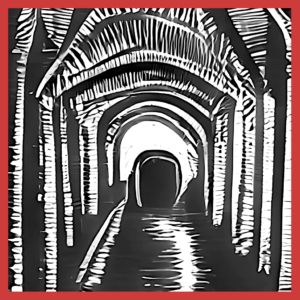Canticle for the Holy and Horrid
XXIX

You shall be an execration, and a horror,
And a curse, and a reproach:
And you shall see this place no more.
Not but a fort-night passed from the night I encountered the vision
Till I was now drug out from the dungeon to destined appointment,
Two of my captors relaying, Your king has confirmed his decision,
Which, as it stands, seems also involving their twisted enjoyment
Shoving me, spitting and slinging their belts on my sore and distressed flesh,
Whilst my companion Baruch was too rapt, to another location
Whether the lariats threatened or, some of us spared and the rest threshed,
Since we had spoken of God, but our crime had no such conversation,
That I had slain two men and had more in my wrathful intention;
Whether Baruch had committed as noxious a deed to our masters,
Otherwise taken for slavery after expressing dissension —
None of our speech had addressed such matters as relevant factors,
Now I am headed along an impossible corridor, harried,
Lengthening every time I collapsed on the ground unforgiving,
Solid and coarse to the touch, blood-globules immed’ately buried
Under the stone-dust; lacking the bravery needed for living,
Little compelled me to move but the pummeling hands to beleaguer,
Blurring my sight and inflaming my ears, I a revenant walking
Toward a fate so calamitous time was but stifled, uneager,
Wherewith a passage forever-extending and psychopomps stalking
Kept me from meeting my fortuneless tumult becoming my portion
Sealing the doors to alternative paths as I neared its conclusion,
Wherein we stepped to the black door, fitted to hewn in contortion,
Something procured from a faraway place as an obvious intrusion
Struck with occult marks, skeletal faces and pagan enigmas,
Baseless geometries weaved into networks, unknown who designed it,
Though at its presence I wondered indeed of our cultural stigmas
Which should forbid us from these, and the man who awaited behind it
Verily ought to be feared if he wishes to arrogate nations
Under a standard the black door here represents to my one eye
Soon to be sure but beyond my precognizant eye’s expectations
Whence had it opened, exposing the luminous kiss from a sun high
Poured from a wide-faced balcony open to air and to sky view
Set with ornate stones; there I observed of a rabbi who, standing,
Fitted with sword I had found, was awaiting; whatever he might do
Stood to contrast this spectacle peaced, for as pigeons were landing
Gently the wind touched down on us, much as a threshing location
Blessed with the vastness of vision upon south Israel’s wild,
Though this stranger was not left breathless at such elevation,
Saying no greeting, but asking, O man, we all once were a child;
Now beest pleased to remember thy youth, hast thou some recollection?
Silent at first, I permitted myself to respond I remember,
Then he replied, Babes cry for the world at initial inspection,
Knowing it suffers a flaw in design, and a curious ember,
Something of flickering soot, glows white on reality’s bald face,
Which for the infant confirms man’s will is in grave misalignment,
What else might it attempt, but exerting its will from its small place,
Wishing the world some other? dost thou comprehend the insignment?
Nay, I had not comprehended, and kept to my quiet; he scowled,
Something is quite wrong, living in impossibly bleak circumstances,
Thou hast to know it, in miser’ble custody, verily fouled,
Missing an eye and a limb and without this: then, he advances,
Brandishing what I had lost from his back, and continued, observe me,
What dost thou see? and I see but a man who pretends as a king’s son,
Tall and untroubled, with fatness enough to be leerful and surly,
Speaking with criminal confidence, much as if this was a thing done,
Not but a temp’rary circumstance wherewith his God shall account him;
Keeping his distance, he asked, is it Abel? (as heard I from mine birds)
Abel, I see — from the cusp of Judea, on fortressed a mountain —
Darkness on rise from the mouth of the nations unknown to divine words,
Threatening watery dusk with their lawless endeavors and rulings,
Which by our father in flesh, good Abraham drawn from his past ways
Knew to repent and to keep of himself from their idols and foolings
Starkly perceiving the signs and the seasons for these, of our last days,
Mounting up wickedness’ pyre reposed for the hand of the One Name
Coming to judge us by deeds, for our willingness, Abel, is wanting,
That if we might not wish it for well in the sight of the sun same
Rising on dreadful creation, reality’s obstinate taunting
That we cannot change, not by our will, and it wills (from creation,
Entering this world) evil, for what hope Abram did muster
Leaving behind the Chaldeans, Haran and the kin of his nation
Lured by the promise invisible, something obscure in its luster
Though nevertheless interweaved with the measure of this preexistence?
Yea, I implore, who was this man Abram who answered the calling,
Fetched from the dark by a silent and still voice, showed no resistance,
Led all his people, his wife and his nephew to a hinterl’nd sprawling
Governed by harlots, idolaters, giants and tribes of accused seed:
Abram had heard God! what does His voice sound like? have I heard it?
Then he produced from his cloak a ceramic antique, and — A bruised reed,
Flickering wick I cannot break, — lifting the object, observed it,
Shimmering spiral of polished ceramic indeed, in a coil,
Circling black void punched at its center, arcane if I guess right;
Glazed by a deft hand, even a heavenly fire and toil,
Though for its purpose, unclear; and he mirthlessly motioned to breast-height
Quickly retracting it, blurring the light all around its encasing,
This is a sign, he began, and the sword thou hast brought to my castle,
That I am truly Messiah, the king of the heaven’s embracing,
Son of Dawid as his heir, and I spoke to the aspirant vassal,
Leaving behind him, the king called David, the odor of violence,
After a tourney of slaughter, his grieved years numbering twenty,
Staunchly refusing the study of portents as arrogant science,
Choosing instead to believe on the Lord for his lot and his plenty
Which to him counted for righteousness, meriting throne for a nation,
Promised to one of exemplary virtue (a victory fearful)
Thus as his gains were abandoned, his king’s birth-right, to my frustration,
Left in a cave in the sheep-folds; now for thee boasting an earful,
Men of a pious position are daily awash in repentance,
Waiting on both a redeemer and teacher of righteousness living,
Shedding their anger and carnal desires so once in attendance,
Not by compulsion, rather as sacrifice, freely it giving,
Sewing the soil abundant with penance to reap in perfection,
That the Messiah will gather a cloud for a chariot burning;
This is the day but to come, we were fashioned for chance resurrection,
That we will witness the rising Messiah — and glory returning;
Not as of thine own rule; then with a chortle he averred,
Crushing the heads of the many, I drank of the torrents on straight path,
Lifting my head, and if this was no sign from the Lord of his favored,
Even his judgment on thee, He shall better to perish away wrath,
Since He has gifted me this as a token of godly believing:
See it, o man — and he raised it with idoling eyes in affection,
Abraham wept, he began, not once, nor permitted his grieving,
When he was asked to deliver his son to a gruesome election,
Neither did Blessed Elijah, a Father, who told us to take thee —
Yea, I remember thy face — with the others, of eight souls,
Bound for the sacrifice last: each prayed God, never forsake me,
Also forgive me for blood, and we slaughtered the lot on the slaked coals,
Wherewith we plied these, soaked in the organs of reprobate priesthood,
Much as the prophet had spake, and by these as were shared by our father,
Suddenly power was given us, saving us wherefrom us each stood;
Only we lost most holy Elijah, so then, as is proper,
Men Masada-bound searched for him endlessly, toward the earth’s ends;
Such is the reason Baruch is imprisoned: he served him sincerely,
Irony! both of you make for an odd pair, greatly absurd friends:
Likely he bound thee or worse; so we ask him for whereabouts nearly,
Though for thee what is inquired is nothing auspicious or needed,
Spinning the coil in hand, he unhanded it, thus it suspended
Hanging in air, levitation by sleight of his hand had proceeded
Wherein it spun on its own in a wicked routine unattended;
See it spinning? he taunted, if sacrificed flesh for consumption,
Even the myst’ries of dreams are revealed, and he violently laid grip,
Suddenly flooding my mind with arterial, bloody eruption,
Heat of a fiery furnace, the awful distress of a blade tip,
Now I had traveled from grave to another for double a grave sin,
Even by one and the same hand, fooled into mercy-believing:
Think of deliverance, drawn from Gehenna, and Romans, and cave-in,
Battle and smoke to prepare for alternative route for my leaving
Bade by the blade of rebellious angels for ill consecration
Equally rid of my sense and my dignity, symbols repeated
That so by purile hands for a curse, a sustained execration
This man born dead kneels to his fate and is herein defeated:
Gripping my throat and its reticent scar, dug fingernails inward,
Blade on my soft flesh plunged as my hot blood started to boil
When it ignited as steel-struck flint which left me uninjured
Watching as something so holy and horrid emerged from the coil.
brought for the lariats • meeting Menahem
a discussion on Messiah • the call of Abraham
sacrificed to an artifact • something besides blood
